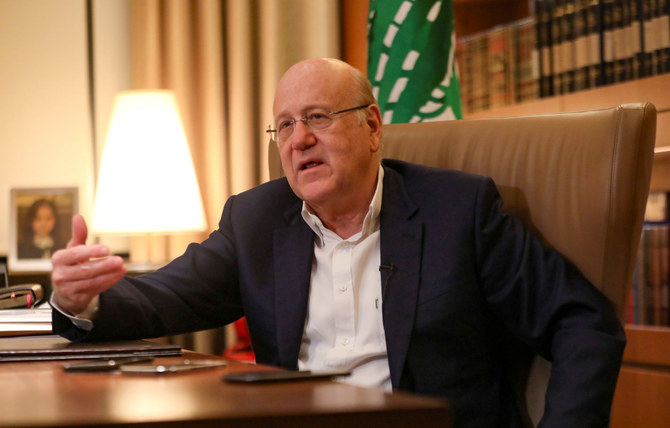BEIRUT: Lebanon’s Prime Minister Najib Mikati said on Monday Beirut faces a slippery slope in its growing diplomatic row with the Gulf following controversial comments made by Information Minister George Kordahi on the Arab coalition’s intervention in Yemen.
Mikati, who is in Scotland to participate in the COP26 climate summit, sent a message on Monday via WhatsApp to government ministers, in which he wrote that he had “asked Kordahi to prioritize his patriotism over everything else, but this has not happened.”
Mikati added: “We are consequently facing a slippery slope.”
The prime minister also said: “If we do not resolve this crisis quickly, we will fall into a disaster that none of us wants. God bears witness that I have warned against this.”
Kordahi has failed so far to apologize for his remarks, and appeared to rule out offering his resignation in a statement on Sunday.
Saudi Arabia believes Kordahi’s statements to be offensive and represent “a new episode of reprehensible and rejected positions issued by Lebanese officials towards the Kingdom and its policies, in addition to Beirut’s failure to take the measures to stop the export of narcotics from Lebanon.”
Beirut has not yet taken any measure to restore ties between the two states, nor Lebanon’s relations with other Gulf nations that have shown solidarity with Saudi Arabia, especially Kuwait, Bahrain and the UAE.
Mikati’s warning came as DHL in Lebanon returned mail and goods to customers who wanted them shipped to Saudi Arabia.
“The DHL administration was informed by the company’s branch in Saudi Arabia on Saturday that no packages can be shipped to the Kingdom, but there are no instructions so far regarding the fate of shipments from Saudi Arabia to Lebanon,” a source told Arab News on Monday, adding “we have returned all packages to our customers and we are yet to receive new instructions.”
This measure falls within the Saudi decision to cut diplomatic and economic ties with Lebanon, which was taken on Oct. 29, against the backdrop of the comments made by Kordahi a month before he was appointed.
Hezbollah’s Mohammed Fneish continued to defend Kordahi and criticized those who stood by the importance of Lebanese-Saudi ties, describing their positions as “demonstrating weakness.”
Fneish said: “If we stand our ground, we will be able to overcome these issues, just as we did many problems and challenges that we faced in the past.”
The website of the National News Agency, the official news agency of the Lebanese state, supervised by Kordahi, was hacked on Saturday afternoon.
Pictures were published on the website containing threats against Kordahi, and the website has since been suspended.
While political observers in Lebanon unanimously agree that Kordahi’s resignation would be the most positive outcome, they believe Mikati’s hands are tied since Shiite government ministers threatened to boycott Cabinet if Tarek Bitar, the judge leading the investigation into the Beirut port blast, is not removed.
The same ministers to have dissented over Bitar are also among those to have also voiced their objection to Kordahi’s removal.
Mikati’s media office reported that he held meetings with several officials on the sidelines of the COP26 summit to discuss Lebanon’s crises, especially the dispute with Saudi Arabia.
Mikati met with French President Emmanuel Macron and the President of the European Council Charles Michel.
He then met with the Managing Director of the IMF Kristalina Georgieva, the Spanish Prime Minister Pedro Sanchez, Italian Prime Minister Mario Draghi, and outgoing German Chancellor Angela Merkel.
Mikati also spoke with Lebanese President Michel Aoun over the phone and discussed “possible measures to address the recent developments.”

